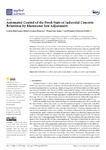Automated Control of the Fresh State of Industrial Concrete Behaviour by Rheometer Test Adjustment

Use this link to cite
http://hdl.handle.net/2183/36654Collections
- Investigación (ETSECCP) [826]
Metadata
Show full item recordTitle
Automated Control of the Fresh State of Industrial Concrete Behaviour by Rheometer Test AdjustmentDate
2023Citation
Rojo-López G, González-Fonteboa B, Carro-López D, Martínez-Abella F. Automated Control of the Fresh State of Industrial Concrete Behaviour by Rheometer Test Adjustment. Applied Sciences. 2023; 13(21):11738. https://doi.org/10.3390/app132111738
Abstract
[Abstract:] This study aimed to develop a rheometer prototype and define a procedure for adjusting the automated control of the fresh state of concrete. Sixteen batches were produced, and their fresh behaviour was measured at different testing times by applying the Abrams cone and flow curve test (FCT) as the rheological protocol. During this test, the yield stress and plastic viscosity of the concretes were measured in relative units. The rheometer prototype was used to define a new protocol to select the most suitable rheometer impeller arrangement and optimal FCT configuration. This protocol considers the torque at the end of the breakdown period, torque reduction during the breakdown period, segregation, and negative values of the yield stress in relative units. This protocol also enabled an iterative adjustment procedure, facilitating the use of a rheometer for the automated control of the homogeneity and behaviour of fresh concrete, as well as real-time decision making.
Keywords
Fresh behaviour
Flow chart
Yield stress
Plastic viscosity
Concrete characterisation
Flow chart
Yield stress
Plastic viscosity
Concrete characterisation
Editor version
Rights
Atribución 3.0 España






